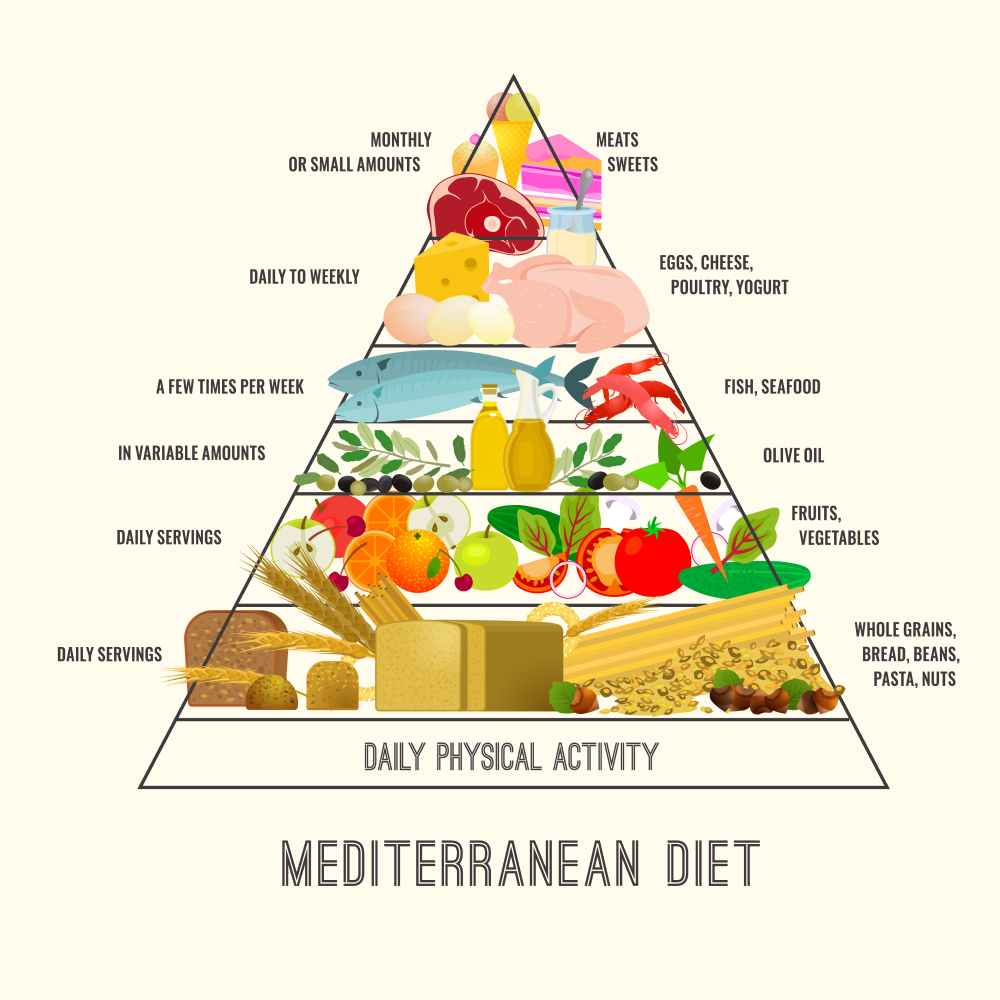Google “the Mediterranean diet” and you’ll find search results suggesting it has numerous health benefits tied to the gut microbiome, improved pregnancy outcomes, and even erectile dysfunction. While a diet claiming to be a cure-all is nothing new, what makes the Mediterranean diet stand out is that some of its alleged perks are actually backed by science.
The key ingredients to a beneficial Mediterranean diet appear to be linked to the volume of fresh fruits and vegetables it involves, the healthy (and – fortuitously – delicious) fats, and – sometimes – even a splash of wine. Sounds too good to be true, right? Well, some of what you see online is, so here are six science-backed benefits of the Mediterranean diet, and practical steps for implementing it into your daily routine.
Lower risk of cancer mortality
A new study explored the influence of the Mediterranean diet in a non-Mediterranean context by looking at people adhering to the meal plan and lifestyle in the United Kingdom. That included eating a healthy, plant-based diet with limited added salts and sugars, as well as sleeping enough, getting a good amount of exercise, and socializing. The findings revealed a 29 percent lower risk of all-cause mortality, and a 28 percent lower risk of death due to cancer, compared to people who didn’t adopt the Mediterranean diet and lifestyle.
“This study suggests that it’s possible for non-Mediterranean populations to adopt the Mediterranean diet using locally available products and to adopt the overall Mediterranean lifestyle within their own cultural contexts,” said lead author Mercedes Sotos Prieto, Ramon y Cajal research fellow at La Universidad Autónoma de Madrid and adjunct assistant professor of environmental health at Harvard Chan School, in a statement. “We’re seeing the transferability of the lifestyle and its positive effects on health.”
Well, that sounds promising for those of us not blessed with having been born into the region, so what else can we stand to gain?
Less adverse outcomes in pregnancy
A 2022 study found that a Mediterranean diet rich in vegetables, legumes, and fish was associated with a lower risk of preeclampsia and gestational diabetes in pregnancy. This link was stronger for those pregnant over the age of 35, and again wasn’t limited by geography or cultural background.
“This multicenter, population-based study validates that a healthier eating pattern is associated with a lower risk of adverse pregnancy outcomes, the most exciting being a 28 percent lower risk for preeclampsia,” Dr Natalie Bello, senior and corresponding author of the study and director of Hypertension Research in the Smidt Heart Institute, said in a statement. “Importantly, this connection between the Mediterranean diet and lower risk of adverse pregnancy outcomes was seen in a geographically, racially and ethnically diverse population.”

Daily exercise is an important part of the Mediterranean lifestyle, but so is socializing with loved ones.
Image credit: Rawpixel.com / Shutterstock.com
Blood pressure
Hypertension is a condition in which a person’s blood pressure is elevated, increasing their risk of cardiovascular disease and even death. A 2020 paper set out to examine the associations of the Mediterranean diet and blood pressure and concluded that strict adherence significantly reduced the risk of hypertension by 36 percent.
Maintaining a healthy blood pressure means maintaining heathy blood flow, which leads us on to another health benefit of the Mediterranean diet…
Erectile dysfunction
Blood flow is a common obstacle in people with erectile dysfunction, with hypertension making it twice as likely. Given the association between the Mediterranean diet and reduced incidences of hypertension, a 2021 study investigated if that meant it also held benefits for erectile dysfunction, and the findings were promising.
“In our study, consuming a Mediterranean diet was linked with better exercise capacity, healthier arteries and blood flow, higher testosterone levels, and better erectile performance,” explained study author Dr Athanasios Angelis in a statement. “It seems plausible that this dietary pattern may improve fitness and erectile performance by enhancing function of the blood vessels and limiting the fall in testosterone that occurs in midlife.”
Lower risk of Multiple Sclerosis
Multiple sclerosis is an autoimmune condition that in its most severe forms can be highly debilitating, greatly decreasing a person’s quality of life. It’s the result of the immune system attacking the body’s own nervous system, but exactly what triggers it remains unclear.
While a 2022 paper concluded that the Epstein-Barr virus is the most likely culprit in the onset of multiple sclerosis, a 2023 study found that diet may also play a protective role, as has been indicated in other inflammatory diseases. It concluded that compared to Western-style diets, the Mediterranean diet may have a protective influence by reducing a person’s risk of developing multiple sclerosis.

The Mediterranean diet is all about variety and enjoying the right things at the right time.
Image credit: Double Brain / Shutterstock.com
Reduced risk of dementia
A lot of research has gone into dementia prevention strategies owing to the severity of its symptoms, and the toll it takes on families and communities. One avenue researchers have explored is the influence of diet and surprise surprise, the Mediterranean diet has been found to be associated with a lower risk of developing dementia.
“Using data from over 60,000 participants, we demonstrated that higher adherence to the MedDiet is associated with lower risk of incident all-cause dementia,” concluded the authors of a 2023 paper. “Specifically, participants with the highest MedDiet adherence had 23 percent lower risk of developing dementia in comparison with those with the lowest level of adherence.”
How to follow the Mediterranean diet and lifestyle
The Mediterranean diet is all about an abundance of fresh, plant-based foods, including whole grains, nuts, and legumes, writes Harvard Health Publishing. The route you choose can be vegetarian, vegan, or include fresh fish and poultry, but red meat is best kept to a minimum. Meanwhile, the lifestyle is about exercise, rest, and socialization.
Here are some of the key steps for adhering to the Mediterranean diet and lifestyle:
- Embrace olive oil as an alternative to other fats
- Enjoy nuts and olives, in moderation
- Switch up sweets for fresh fruit
- Kick off meals with a salad
- Try to get three servings of legumes into your weekly menu
- Eat wholegrains
- Get the right amount of rest
- Exercise regularly, including walking
- Socialize with loved ones
It’s always best to consult your healthcare provider before making any drastic changes to your diet and exercise, and of course, elements of the Mediterranean diet will be easier for some to access than others. However, taking steps to make small, healthy changes can contribute towards long-term change, and the best thing about the Mediterranean diet? It tastes great, too.
Source Link: 6 Science-Backed Benefits Of The Mediterranean Diet And How To Implement It